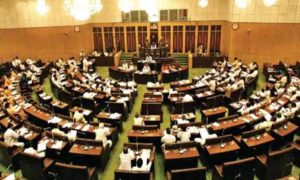As everyone knows that the AP Government has recently passed the bill proposing, 3 CAPITALS TO ANDHRA PRADESH, the AP Decentralisation bill and the other bill to scrap APCRDA. The bill passed in the legislative assembly and it will only become an act when it gets passed in the legislative council, where the opposition TDP has majority seats there.
AP Finance minister Buggana Rajendra proposed the Decentralization bill in the legislative council. The Telugu Desam Party opposed the bill and imposed rule 71. The discussions on RULE 71 hits a huge storm in social media after this. So, let us know what is rule 71. What are its circumstances and will this really work for TDP to stop the 3 capital agenda of the ruling YCP Government.
WHAT IS RULE 71?
- Generally, the procedure for a bill to become an act is, first the bill should pass in the legislative assembly.
- Then, if the bill is passed, it will now be introduced in the legislative council.
- And if the bill is passed here, after the governor’s signature, the bill becomes an act.
- Here, the TDP party which has the majority in the council opposed the bill using RULE 71.

RULE 71, is a constitutional right given to the Council. Before starting the council sessions, a member should give notice to the council chairman that they have an objection to the bill passed in the assembly.
After the council sessions start, the chairman will ask the members to debate and send back this bill to the assembly. Generally, when a bill fails to pass in the council which is imposed by the ruling government, then it can be considered as a success of the opposition party.
Now, the bill will be sent back to the assembly for amendments and discussions and after that again, the bill will be sent back to the council to pass it. And if the bill will again fail to pass, it will be sent back to the assembly again. However, after the second time, the government can give that to the governor for approval. And if the government approves it, the bill becomes an act.

The only thing TDP did was that it delayed the process of decentralization. Now, the bill will only get into a discussion in the assembly when the next assembly sessions start after a few months. So, the government may dissolve the legislative council in this meantime. The opposition might be in an idea to enhance the protests.
Already, many Amaravati farmers filed the petition in the court. This will come into hearing in few days. The court should hear the words of the ruling, opposition, and farmers individually. In the meantime, the central government can involve in this. So, this might help in delaying the process for months or sometimes years.




